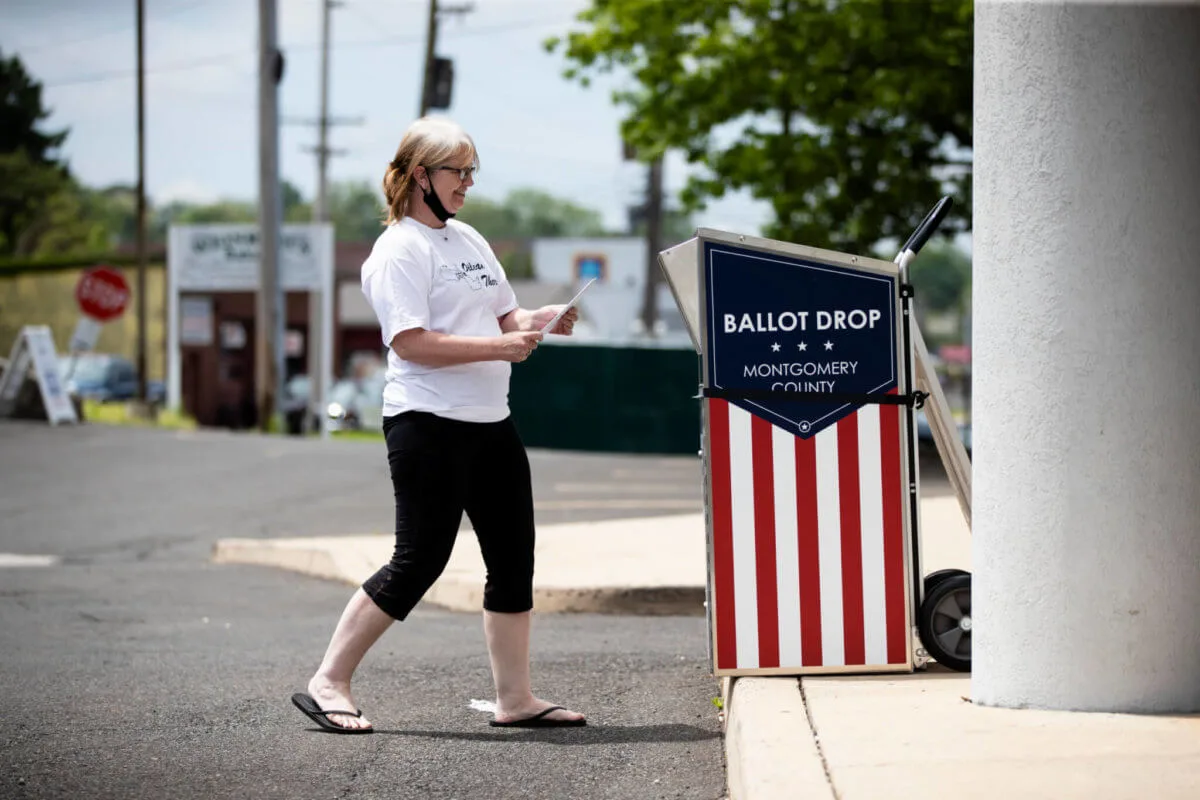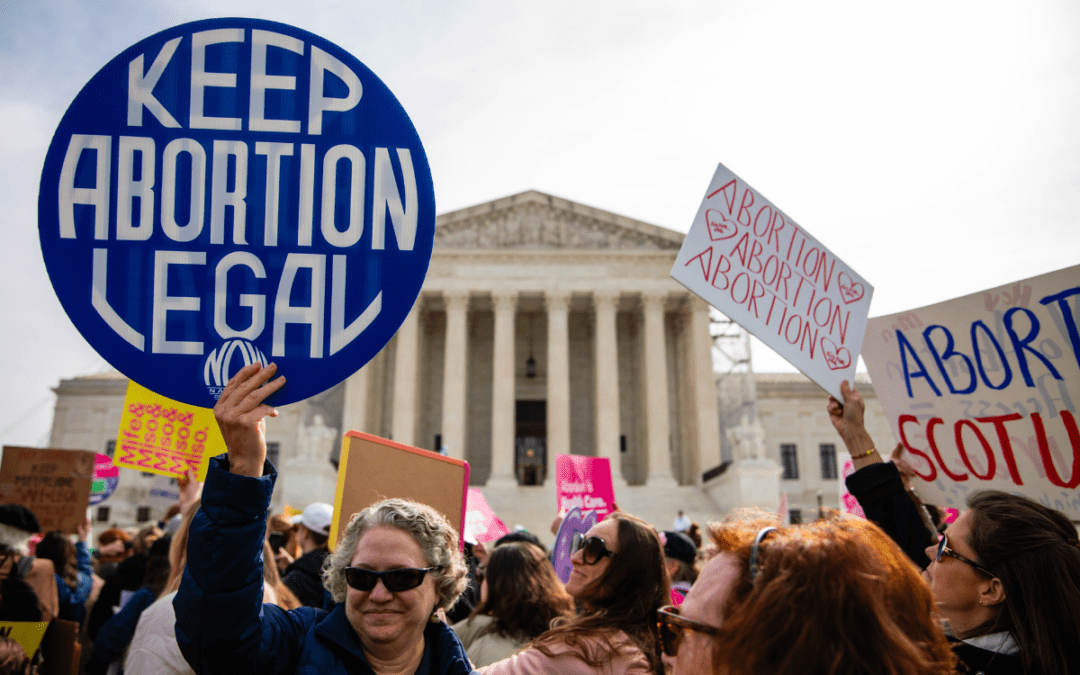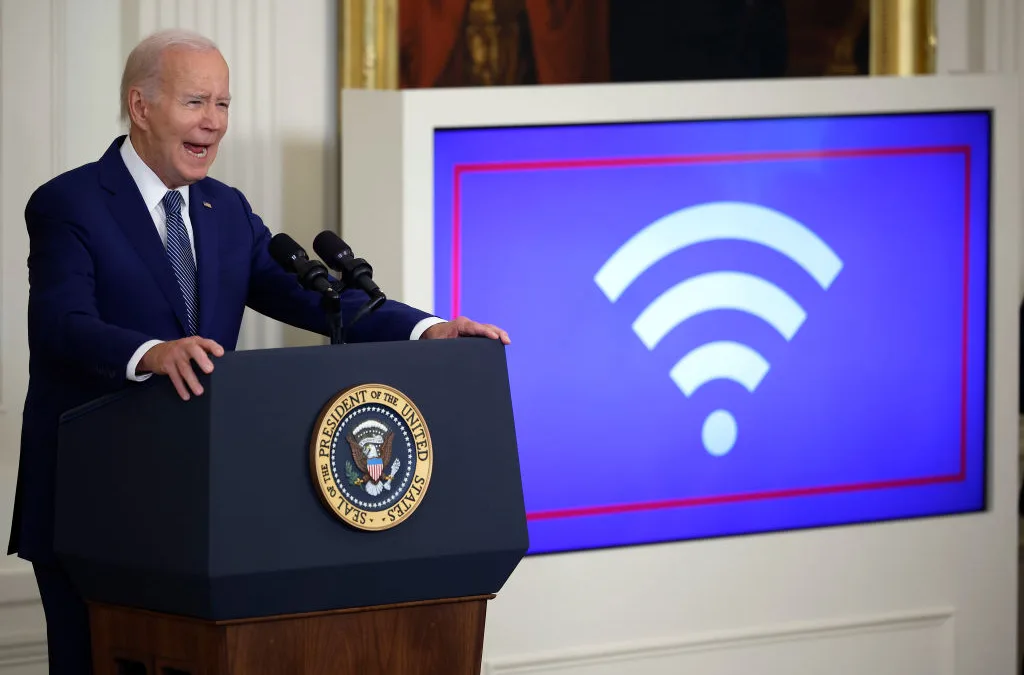
A voter drops off their mail-in ballot prior to the primary election, in Willow Grove, Montgomery County, May 27, 2020. (AP Photo/Matt Rourke)
As the Republican-controlled Pennsylvania Legislature works to pass voter suppression laws, Democrats in Congress have one chance to stop the assault on voting rights.
WASHINGTON — Earlier this month, President Joe Biden signed the American Rescue Plan into law, sending $1,400 stimulus checks to most Pennsylvanians, extending federal unemployment benefits, providing most parents a guaranteed monthly income, giving schools money to reopen, and bolstering vaccine production and distribution.
The passage of the bill, which was backed by 59% of Pennsylvanians, according to a recent poll, was only possible because Pennsylvania residents voted in record numbers in November to send Biden to the White House.
Now, Republicans in the state Legislature are responding to Biden’s victory by introducing a flurry of bills that would make it more difficult to vote.
To stop the GOP’s war on voting rights, Democrats at the national level have one arrow left in their quiver: the For The People Act (HR 1).
Passed by the US House on March 3, HR 1 would allow automatic voter registration, set unified early and mail-in voting standards, enact campaign finance reform, and modernize elections while ensuring their security.
The bill is also all but certain to stall out in the Senate.
Minority Leader Mitch McConnell (R-Kentucky) has made clear he opposes the comprehensive democracy reform bill. If Democrats choose to eliminate the filibuster—a Senate procedure that allows any one senator to obstruct a bill from being voted on and requires 60 senators to override—they could pass the For the People Act with their 50-vote majority and halt the voter suppression efforts in Pennsylvania.
Republican lawmakers in states across the country have introduced more than 250 bills to disenfranchise voters, according to the Brennan Center for Justice at New York University Law School. Pennsylvania is among the states leading the way in these efforts, as legislators have proposed more than a dozen bills designed to restrict voting access.
The battles over the For the People Act and the filibuster will play out in the coming weeks and months. As Republican lawmakers in Pennsylvania and other states have made clear, there is a lot at stake.
‘Divorced From Reality’
Even though former President Donald Trump lost Pennsylvania, 2020 was, by all accounts, a good year for the state GOP. They gained seats in the legislature, won two of three statewide races, and held onto all nine of their congressional seats.
Despite this reality, several Republican lawmakers are working to overhaul voting laws, with a particular focus on eliminating no-excuse mail voting, a policy the very same GOP-led legislature passed with bipartisan support in 2019. Republicans have also introduced bills to eliminate permanent early voter lists, ban the use of ballot drop boxes, discount all mail ballots received after Election Day, and reject absentee ballots with signature issues unless they’re resolved within six days of notification.
The GOP is also trying to overhaul how State Supreme Court justices are chosen through a constitutional amendment that would elect judges by regions rather than statewide. This would create judicial districts that disproportionately hand power to rural, conservative regions, effectively cementing Republican control of the court, which currently has a 5-2 Democratic majority. Democrats have compared the effort to gerrymandering—the practice of drawing congressional and state legislative districts in such a way as to ensure the party in power remains in power.
A state House committee is also conducting a series of “election oversight” hearings that are scheduled to run through early May. Committee chair Rep. Seth Grove (R-York) recently told the New Castle News that the House should wait until those hearings conclude until it passes any election-related bills.
Ultimately, these bills are likely to fail or be vetoed by Pennsylvania Gov. Tom Wolf, a Democrat. Still, they have been criticized by voting rights advocates and Democratic lawmakers, who view them as a cynical attempt to roll back access to the ballot box in order to appease Trump, who spent months lying about voter fraud. Between August and January, the former president made nearly 2,300 false or misleading claims about the 2020 election, according to a Washington Post database. Not a single of those statements was ever proven, and his campaign lost more than 60 court cases challenging election results.
“Donald Trump created a narrative [of voter fraud] and fanned the flames on that narrative,” David Thornburgh, president and CEO of the Committee of Seventy, a nonpartisan civic leadership organization, told The Keystone.
Trump’s lies have led some state lawmakers down this path, Thornburgh argued, despite the fact that their arguments about voter fraud are “divorced from reality.”
“It’s really unfortunate,” he said. “It’s dangerous.”
The consequences of these voter suppression efforts and the ongoing partisan split over election results could be devastating for democracy, according to Thornburgh. He worries that whoever loses an election in the future can now allege fraud, claim the election was rigged, and have a lot of people believe them.
“Once Pandora’s box is open, it’s very hard to to close it and then you can sort of imagine free falling into a situation where this bedrock of democracy—imperfect as it is that we’ve built and tried to care for these several hundred years—is seriously eroded,” Thornburgh said.
More restrictive voting laws could also make it harder for people, particularly low-income residents and people of color, to participate in elections, and make it easier for lawmakers to only represent the interests of a slice of the electorate, rather than all of their constituents.
The focus on nonexistent fraud also clouds actual problems that need addressing, Thornburgh added. These include the current inability of county boards of election to process mail ballots prior to Election Day. Democrats pushed last year to allow counties to open, sort, and verify mail ballots prior to Nov. 3, but Republicans blocked the effort, resulting in the days-long delay in Pennsylvania announcing its election results. This, he said, left the state “vulnerable to misrepresentations and falsehoods about what was going on with the elections.”
HR 1 ‘Gives Power Back to People’
While lawmakers in Pennsylvania and other swing states work to tighten voting laws and make it more difficult to participate in elections, Democrats—including members of Pennsylvania’s congressional delegation—are working to do the opposite: make voting more accessible for all eligible Americans by passing the For the People Act.
When it was first introduced, the bill was called “the most significant democracy reform bill in a generation,” and that description holds true today.
The sweeping proposal would remove barriers to voter registration, allowing for online and same-day voter registration. Under the federal law, the state would also automatically register any eligible Pennsylvanian who interacts with government agencies. The impact of these measures could be enormous.
“Passing the For the People Act could help ensure that the 2 million Pennsylvanians who don’t participate in our elections can register to vote and have their voices heard,” Khalif Ali, executive director of Common Cause Pennsylvania, a nonpartisan group focused on defending democracy, wrote in a recent letter to the editor in the Pittsburgh Post-Gazette.
The law would also set national standards mandating at least 15 early-voting days, including weekends. (Pennsylvania state law does not currently allow for in-person early voting.) The bill would also allow any voter who wants to vote by mail and authorize election officials to begin counting ballots before Election Day to prevent delays in results.
The For the People Act would furthermore end partisan gerrymandering, which allows the party in power to control how districts are drawn, allowing politicians to choose who they represent in such a way as to entrench their own power. The law would establish independent redistricting commissions made up of an equal number of Democrats, Republicans, and independents to publicly draw new district maps. This would include enhanced protections for racial and ethnic groups who are most often disenfranchised.
Pennsylvania is no stranger to gerrymandering, as Republicans took advantage of their 2010 election wins to redraw maps to their benefit in 2011. Numerous analyses showed that the state’s map was among the five most gerrymandered in the country, and in the three elections held under the map—in 2012, 2014, and 2016—Republicans won 13 of 18 US House seats. These lopsided victories came even as Democrats President Barack Obama and Sen. Bob Casey each won by more than 5% statewide in 2012 and Wolf won by nearly 10% in 2014. When Trump and Republican Sen. Pat Toomey won in 2016, they did so by less than 1.5%—and yet the congressional delegation remained a 13-5 split.
In other words, even though Pennsylvania voters over the past decade often elected Democrats in statewide elections, the state’s gerrymandered map allowed Republicans to win a disproportionate amount of seats and gain outsized political power.
The state’s map changed for the 2018 elections, however, after a group of Democratic voters, led by the League of Women Voters of Pennsylvania, successfully sued over the gerrymander, prompting the Pennsylvania Supreme Court to draw its own map, which has resulted in a 9-9 split between Democrats and Republicans.
Even though Republicans have criticized the For The People Act in recent weeks, the bill is broadly popular, as 67% of voters, including 56% of Republicans, support the proposal according to a January poll from Data for Progress. With the American Rescue Plan in the rearview mirror, securing democracy and preserving voting rights is now one of the top priorities for Democrats and their allies.
“This is a once-in-a-generation opportunity to strengthen our democracy and protect voting rights for all Americans,” Ali wrote. “We call on congressional Republicans and all members of Congress to support this legislation to help protect our right to vote.”
If Republican legislatures succeed in gutting voting access, however, not only will democracy be under siege, but Biden’s COVID relief plan—which will likely play a key role in Pennsylvania’s recovery from the pandemic and return to normalcy—might be the last major bill to help ordinary Americans for some time.
Politics

How Project 2025 aims to ban abortion in Pennsylvania
Former president Donald Trump said abortion was a state’s rights issue recently, but conservative organizations, under the banner “Project 2025,”...

736,000 PA households could lose crucial help on their internet bills
Time is running out for the Affordable Connectivity Program, which provides low-cost high speed internet access for over 736,000 Pennsylvania...

What to know about Trump’s legal issues
Over the past year, former president Donald Trump has become the center of not one, not two, not three, but four criminal investigations, at both...
Local News

Conjoined twins from Berks County die at age 62
Conjoined twins Lori and George Schappell, who pursued separate careers, interests and relationships during lives that defied medical expectations,...

Railroad agrees to $600 million settlement for fiery Ohio derailment, residents fear it’s not enough
Norfolk Southern has agreed to pay $600 million in a class-action lawsuit settlement for a fiery train derailment in February 2023 in eastern Ohio,...






